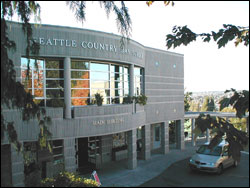THE NEIGHBORHOOD angst over the expansion of exclusive Seattle Country Day School, tucked into the slope of north Queen Anne Hill, seems to be about class as well as classrooms and can be felt as far away as City Hall. Neighbor John Caldbick says the building project that will raze five homes and turn a dead-end street into a throughway will crush the residential neighborhood and could lead to long-term zoning changes, which is why 291 residents have signed a petition opposing it. He suspects the city’s Department of Construction and Land Use is biased because DCLU’s director sent her child to the school. His blood heats up in the morning, he says, when the Volvos and SUVs start queuing up for the private school, dropping off some of the 300 elementary and middle-school children whose parents pay up to $13,000 in tuition. “This is an extremely elitist group,” says Caldbick, an attorney and investor in the legendary Blue Moon Tavern. He works out of his home office in the upper-middle-class neighborhood that surrounds Country Day’s compact campus. “And like Leona Helmsley,” he says of New York’s ex-Queen of Mean, “they have complete contempt for the little people.”
Sara L. Zito, the acting head of the school, takes such complaints calmly. “We have a diverse population of families, and that’s important to us,” she says. The students, 80 percent of them white, are indeed special. To enroll, they must have scored in the upper 3 percent of an intelligence test administered by a psychologist and have passed an intellectual inquiry by the school admissions committee. There might be resentment about privilege, she allows, but “I absolutely feel a sensitivity to our neighbors.”
As a class war, the battle over Country Day has well-heeled troops on both sides, each with their cavalry of SUVs and Volvos, and some in the neighborhood, too, send their kids to the private school.
THE NONPROFIT K-8 school began in a church basement in Burien in 1964 and now has $8 million in assets and pays its top teachers from $64,000 to $68,000. In recent years, Country Day has quietly expanded from a brick academy building at the end of Nob Hill Avenue North into several modern stone-and-glass additions on Fourth Avenue North. The school spreads across two and a half L-shaped acres where students concentrate on math, science, and technology, usually no more than 16 to a classroom. Zito stands outside and points to several homes on the slope below, where the new buildings will go. The two- and three-story classroom and school-office structures will give Country Day 87,000 square feet of additional space, 60 parking spaces, a signature new entrance, and a drive-through drop-off. The school has grown by a few students annually, and the additions are not designed to increase enrollment, says Zito.
Caldbick doesn’t believe that. He offered to draw up a binding legal agreement to cap enrollment, but the school turned him down. More exercising, he says, is not being listened to. “The school has been telling us for months that they’re interested to work with the neighbors, but every time we make a suggestion, we are either told that it will be studied or that our suggestion is not compatible with their ‘programmatic needs.'” Caldbick says the school’s representatives strong-armed some local homeowners into selling and moving, including an elderly woman who, he says, “was told in no uncertain terms that the school would be built all around her if she didn’t sell, and that the value of her house would be greatly reduced by that.” Not that a home in the area would be cheap, even at a reduced price. The surrounding neighborhood includes million-dollar houses and condos.
IN THE MIDDLE of all this is DCLU, and its director, Diane Sugimura. “My daughter attended the school nine years ago,” she says, “and I live within a couple blocks of the school,” so she has recused herself from any role in the school’s permit application. Land-use planner Cliff Portman says that, due in part to the neighbors’ complaints, the city will require the school to mitigate its plans and complete an environmental- impact statement, a move supported by the Queen Anne Community Council. The permit process will take at least several months, he says, and he applauds the efforts of Caldbick and others. “The neighborhood is doing a great job of informing us of their concerns,” he says. Adds the school’s Zito: “We are trying very hard to respect their concerns about traffic and expansion.”
It’s not merely “concerns,” says Caldbick. He remembers an earlier meeting attended by some school parents, one of whom stood up and opposed an alternative neighborhood traffic/busing plan because it would require her to get up 20 minutes earlier. “They just act as if this is a done deal,” he says, “and that is really infuriating.”
A public hearing will be held Wed., Oct. 15 at 7 p.m., at 411 Boston St.








